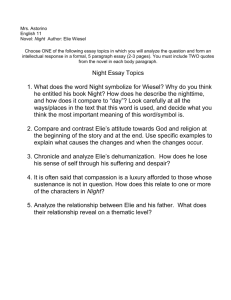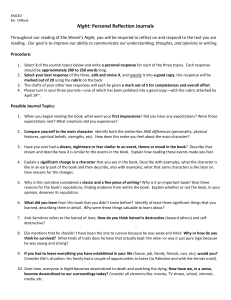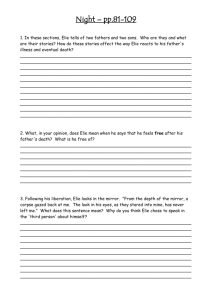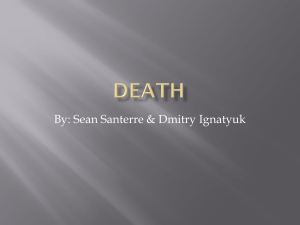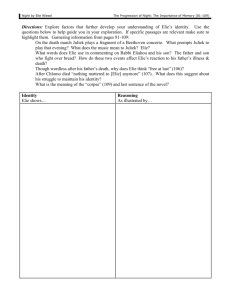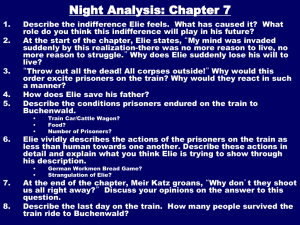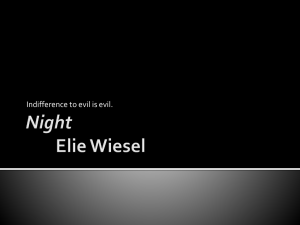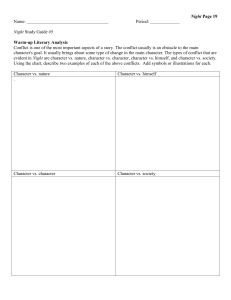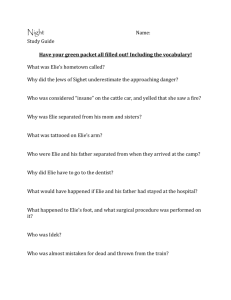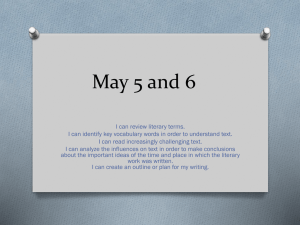Night by Elie Wiesel Teaching Guide
advertisement
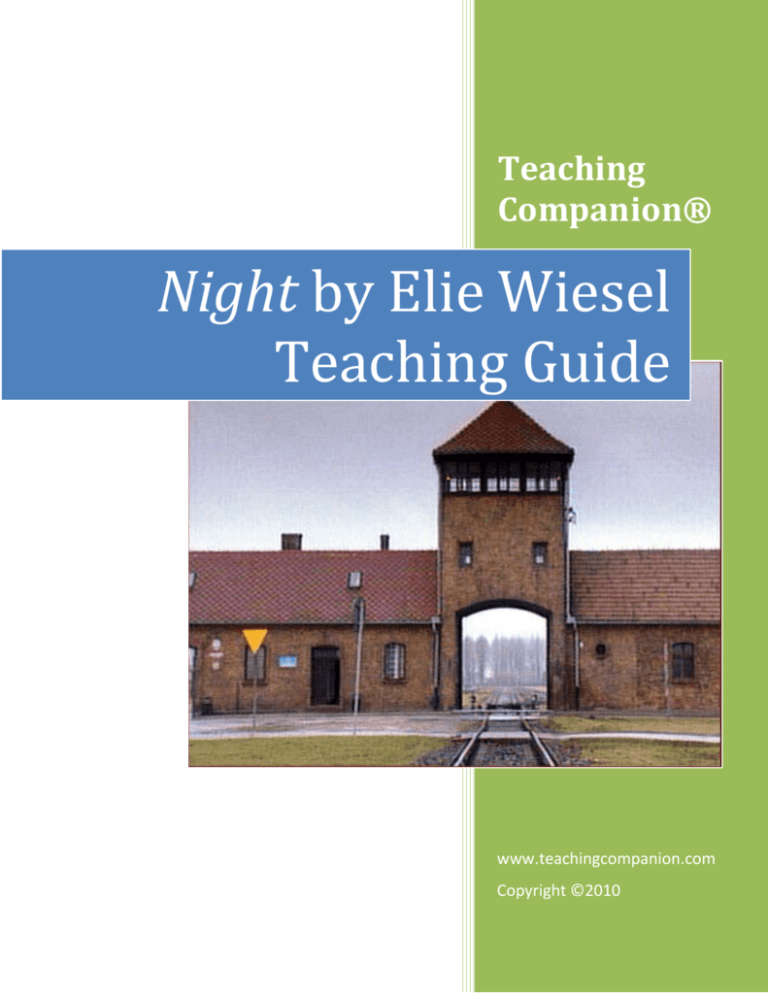
Teaching Companion® Night by Elie Wiesel Teaching Guide www.teachingcompanion.com Copyright ©2010 Night Unit Calendar Monday Research Blitz Week 1 • Week 2 • • • Week 3 • • • Week 4 • • • • Tuesday • • • Vocabulary Section 1(B) Begin Elie Wiesel Timeline Reading • Comprehension Questions Set Four Vocabulary Section 5 Reading • Comprehension Questions Sets 7-9 Graffiti Elie Wiesel Timeline Elie Wiesel Paragraph Research Results Film Package Begin Schindler’s List Wednesday • Comprehension Questions Set One Vocabulary Section 2 Reading • • • • • Faith Statements and Discussion Faith Paragraph Peer Editing Reading • • • Theme Theme Statements Begin Theme Collage • • • • • • • • Continue Film Thursday • • Friday • • • • Finish Film Vocabulary Section 1(A) Distribute Texts Reading • • • Comprehension Questions Set Three Elie Wiesel Timeline Vocabulary Review Reading • • • • Vocabulary Quiz (1-3) Vocabulary Section 4 Personal Response #1 Reading Comprehension Questions Set Five Elie Wiesel Timeline Vocabulary Section 6 Reading • • • • Faith Paragraph Due Vocabulary Review Personal Response #2 Reading • • • • Vocabulary Quiz (4-6) Comprehension Questions Set Six Vocabulary Section 8 Reading Theme Collage Work Time • Theme Collage Presentations Review Jeopardy Personal Response #3 • Unit Test Comprehension Questions Set Two Vocabulary Section 3 Reading • • • Vocabulary Review Continue Film NIGHT Lesson Plans Table of Contents Lesson #1....................................................................................................................................................... 4 Lightning Research .................................................................................................................................... 4 Lesson #2....................................................................................................................................................... 4 Research Presentations ............................................................................................................................ 4 Schindler's List........................................................................................................................................... 4 Lesson #3....................................................................................................................................................... 5 Continue Schindler's List ........................................................................................................................... 5 Lesson #4....................................................................................................................................................... 5 Continue Schindler's List ........................................................................................................................... 5 Lesson #5....................................................................................................................................................... 5 Finish Schindler's List ................................................................................................................................ 5 Vocabulary 1(A)......................................................................................................................................... 5 Begin Night................................................................................................................................................ 5 Lesson #6....................................................................................................................................................... 6 Begin Elie Wiesel Timeline ........................................................................................................................ 6 Vocabulary 1(B) ......................................................................................................................................... 6 Reading ..................................................................................................................................................... 6 Lesson #7....................................................................................................................................................... 6 Comprehension Questions Section 1 ........................................................................................................ 6 Vocabulary 2 ............................................................................................................................................. 6 Reading ..................................................................................................................................................... 7 Lesson #8....................................................................................................................................................... 7 Comprehension Questions Section 2 ........................................................................................................ 7 Vocabulary 3 ............................................................................................................................................. 7 Reading ..................................................................................................................................................... 7 Lesson#9 ....................................................................................................................................................... 7 Comprehension Questions Section 3 ........................................................................................................ 7 Elie Wiesel Timeline .................................................................................................................................. 8 Vocabulary Review .................................................................................................................................... 8 Copyright ©2011 www.teachingcompanion.com 1 NIGHT Lesson Plans Crossword ............................................................................................................................................. 8 Giant Sentence Competition ................................................................................................................. 8 Reading ..................................................................................................................................................... 8 Lesson #10..................................................................................................................................................... 8 Vocabulary Quiz (Sections 1-3) ................................................................................................................. 8 Vocabulary 4 ............................................................................................................................................. 9 Personal Response #1 ............................................................................................................................... 9 Reading ..................................................................................................................................................... 9 Lesson#11 ..................................................................................................................................................... 9 Comprehension Questions Section 4 ........................................................................................................ 9 Vocabulary 4 ............................................................................................................................................. 9 Reading ................................................................................................................................................... 10 Lesson #12................................................................................................................................................... 10 Faith ........................................................................................................................................................ 10 Faith Statements ................................................................................................................................. 10 Faith Paragraph ................................................................................................................................... 10 Peer Editing ............................................................................................................................................. 10 Reading ................................................................................................................................................... 11 Lesson #13................................................................................................................................................... 11 Comprehension Questions Section 5 ...................................................................................................... 11 Elie Wiesel Timeline ................................................................................................................................ 11 Vocabulary 6 ........................................................................................................................................... 11 Reading ................................................................................................................................................... 11 Lesson #14................................................................................................................................................... 12 Faith Paragraph Due ............................................................................................................................... 12 Vocabulary Review .................................................................................................................................. 12 Crossword ........................................................................................................................................... 12 Giant Sentence Competition ............................................................................................................... 12 Personal Response #2 ............................................................................................................................. 12 Reading ................................................................................................................................................... 12 Lesson #15................................................................................................................................................... 13 Vocabulary Quiz (Sections 4-6) ............................................................................................................... 13 Copyright ©2011 www.teachingcompanion.com 2 NIGHT Lesson Plans Comprehension Questions Section 6 ...................................................................................................... 13 Vocabulary 8 ........................................................................................................................................... 13 Reading ................................................................................................................................................... 13 Lesson #16................................................................................................................................................... 14 Comprehension Questions Sections 7-9 ................................................................................................. 14 Graffiti ..................................................................................................................................................... 14 Elie Wiesel Timeline ................................................................................................................................ 14 Elie Wiesel Paragraph ............................................................................................................................. 14 Lesson #17................................................................................................................................................... 15 Theme ..................................................................................................................................................... 15 Theme Statements .................................................................................................................................. 15 Theme Collage......................................................................................................................................... 16 Lesson #18................................................................................................................................................... 16 Theme Collages Continued ..................................................................................................................... 16 Lesson #19................................................................................................................................................... 17 Theme Collage Presentations ................................................................................................................. 17 Review Jeopardy ..................................................................................................................................... 17 Personal Response #2 ............................................................................................................................. 17 Lesson #20................................................................................................................................................... 17 Unit Test .................................................................................................................................................. 17 Copyright ©2011 www.teachingcompanion.com 3 NIGHT Lesson Plans Lesson #1 Lightning Research This activity will introduce students to some of the key contextual topics for Elie Wiesel's Night. Students have just one period of class time to complete their research, so they must work fast. Each group will present their research at the beginning of next class. 1. Explain to students that the next text they will be studying is a survivor's account of the Holocaust. Ask your students if they know anything about the Holocaust. Get a feel for their level of knowledge on the subject, and have a brief discussion that covers the basics. 2. Distribute the Lightning Research handout and read through it with your class. 3. Divide students into six groups by numbering them off (or by whatever method you prefer). 4. Groups then have the rest of the class to complete their research. Remind students to divide the work up and to be quick and efficient. Groups should save a little time at the end of the period to organize their information and get ready to present. 5. Students will present their research the next day. The presentations should be short, and must include an overhead or handout with the most important points for students to record in their notes. Lesson #2 Research Presentations Students will now present what they learned during their Lightning Research. Students should take notes on what is presented. 1. Assign a random order for groups to present. 2. Each group presents their research results. 3. Students take notes on information presented. Schindler's List Over the next four classes, students will work on a series of activities while watching Schindler's List, Steven Spielberg's award-winning film about Holocaust. This film, along with their research assignment, will give them a good contextual framework, and will help them to better understand the events and themes in Elie Wiesel's Night. 1. Distribute the Schindler's List Worksheet Package. 2. Students complete the pre-viewing activities (definitions and diary entry). 3. Begin the film. Students are to answer the comprehension questions while watching the film. Copyright ©2011 www.teachingcompanion.com 4 NIGHT Lesson Plans Lesson #3 Continue Schindler's List 1. Before continuing the film, have a brief discussion about what has happened so far. Ask your students what they have learned, what surprised them, how it made them feel, etc. 2. Continue watching Schindler's List. 3. Students are to answer the comprehension questions while watching the film. Lesson #4 Continue Schindler's List 1. Before continuing the film, have a brief discussion about what has happened so far. Ask your students what they have learned, what surprised them, how it made them feel, etc. 2. Continue watching Schindler's List. 3. Students are to answer the comprehension questions while watching the film. Lesson #5 Finish Schindler's List 1. Watch the remainder of the film. 2. Student should continue to answer the comprehension questions. 3. When the film is finished, give students a little time to start working on their two post-viewing paragraphs. They are to finish these for homework. Vocabulary 1(A) 1. Distribute the Vocabulary sheets. 2. If you have access to dictionaries or computers, have your students look up and record definitions. If you don't have access to dictionaries or computers, write the definitions on the board and have students copy them into their notes. 3. Students must then write example sentences for each word. 4. Circulate checking example sentences to make sure students are using the words correctly. Begin Night 1. Distribute the texts. 2. Begin reading. You can have students read silently, have them take turns reading aloud, or read to them. Homework Reminder: Students are to finish their Schindler's List Package and read to end of Section 1(A) for next day. Copyright ©2011 www.teachingcompanion.com 5 NIGHT Lesson Plans Lesson #6 Begin Elie Wiesel Timeline In this ongoing assignment, students will periodically describe Wiesel's circumstances and personality. The objective is to track the major events in Elie's story, and the effects they have on him. The end result will be a paragraph about how Elie changes over the course of the story. 1. Distribute the Elie Wiesel Timeline handout. 2. Explain the assignment: students are to fill in the chart by describing the circumstances and environment Wiesel finds himself in, and key details about his personality and perspective at each interval in the story. 3. The first entries will show who Wiesel is at the beginning of the story (a pious, curious, sensitive, naive young boy in a Romanian village called Sighet). Vocabulary 1(B) 1. If you have access to dictionaries or computers, have your students look up and record definitions. If you don't have access to dictionaries or computers, write the definitions on the board and have students copy them into their notes. 2. Students must then write example sentences for each word. 3. Circulate checking example sentences to make sure students are using the words correctly. Reading Students are to continue reading the text silently. Reading is the obvious foundation of everything we do in an English class, and is a valuable use of class time. Independent reading improves spelling, vocabulary, grammar, and comprehension. It is essential practice. Homework Reminder: Students are to read to end of Section 1(B) for next day. Lesson #7 Comprehension Questions Section 1 Each section of the text is accompanied by a set of comprehension questions. Students are to answer these questions with full sentences. 1. Distribute Comprehension Questions. 2. Students are to answer questions for Section 1. 3. Go over and discuss the answers when students are finished. Vocabulary 2 1. If you have access to dictionaries or computers, have your students look up and record definitions. If you don't have access to dictionaries or computers, write the definitions on the board and have students copy them into their notes. 2. Students must then write example sentences for each word. Copyright ©2011 www.teachingcompanion.com 6 NIGHT Lesson Plans 3. Circulate checking example sentences to make sure students are using the words correctly. Reading Students are to continue reading the text silently. Reading is the obvious foundation of everything we do in an English class, and is a valuable use of class time. Independent reading improves spelling, vocabulary, grammar, and comprehension. It is essential practice. Homework Reminder: Students are to read to end of Section 2 for next day. Lesson #8 Comprehension Questions Section 2 Each section of the text is accompanied by a set of comprehension questions. Students are to answer these questions with full sentences. 1. Distribute Comprehension Questions. 2. Students are to answer questions with full sentences. 3. Go over and discuss the answers when students are finished. Vocabulary 3 1. If you have access to dictionaries or computers, have your students look up and record definitions. If you don't have access to dictionaries or computers, write the definitions on the board and have students copy them into their notes. 2. Students must then write example sentences for each word. 3. Circulate checking example sentences to make sure students are using the words correctly. Reading Students are to continue reading the text silently. Reading is the obvious foundation of everything we do in an English class, and is a valuable use of class time. Independent reading improves spelling, vocabulary, grammar, and comprehension. It is essential practice. Homework Reminder: Students are to read to end of Section 3 for next day. Lesson#9 Comprehension Questions Section 3 Each section of the text is accompanied by a set of comprehension questions. Students are to answer these questions with full sentences. 1. Distribute Comprehension Questions. 2. Students are to answer questions with full sentences. 3. Go over and discuss the answers when students are finished. Copyright ©2011 www.teachingcompanion.com 7 NIGHT Lesson Plans Elie Wiesel Timeline 1. Discuss the changes in Elie Wiesel's circumstances and environment. Has Wiesel changed? How is he different from how he was at the beginning of the story? What major events have affected him? 2. Students complete second set of entries for the Elie Wiesel Timeline. Vocabulary Review This unit includes two vocabulary quizzes and a vocabulary section on the unit test. Before each quiz, students should review the vocabulary they have learned. Crossword 1. Distribute Vocabulary Review Crossword #1. 2. Students complete crosswords. 3. Go over the answers when everyone is finished. Giant Sentence Competition 1. Students are to write a sentence using as many of the vocabulary words from sections 1-3 as they can. 2. The sentence must be grammatically correct, and must use the words in proper context. 3. Invite your students to share their sentences with the class when they have finished. 4. Award a prize for the best sentence. Reading Students are to continue reading the text silently. Reading is the obvious foundation of everything we do in an English class, and is a valuable use of class time. Independent reading improves spelling, vocabulary, grammar, and comprehension. It is essential practice. Homework Reminder: Vocabulary quiz tomorrow. Lesson #10 Vocabulary Quiz (Sections 1-3) This is the first of two vocabulary quizzes. 1. 2. 3. 4. 5. 6. Distribute the quiz face-down. When quizzes have all been handed-out, students may begin. Tell students to turn their quizzes face-down again when finished. Collect quizzes and redistribute them for marking. Students mark each other quizzes. Collect. Copyright ©2011 www.teachingcompanion.com 8 NIGHT Lesson Plans Vocabulary 4 1. If you have access to dictionaries or computers, have your students look up and record definitions. If you don't have access to dictionaries or computers, write the definitions on the board and have students copy them into their notes. 2. Students must then write example sentences for each word. 3. Circulate checking example sentences to make sure students are using the words correctly. Personal Response #1 This is the first of three personal responses students will write during this unit. Students are to share their thoughts and feelings about the events, people, and themes described in the text. 1. Tell your students they will be writing three personal responses to Night. 2. Each personal response must discuss thoughts and feelings about events, people, and themes described in the text. 3. The responses must go beyond plot summary, and should focus on the students' own reaction to what they have read, not simply what has happened in the story. 4. Each response must be at least one page, double-spaced. Reading Students are to continue reading the text silently. Reading is the obvious foundation of everything we do in an English class, and is a valuable use of class time. Independent reading improves spelling, vocabulary, grammar, and comprehension. It is essential practice. Homework Reminder: Students are to read to end of Section 4 for next day. Lesson#11 Comprehension Questions Section 4 Each section of the text is accompanied by a set of comprehension questions. Students are to answer these questions with full sentences. 1. Distribute Comprehension Questions. 2. Students are to answer questions with full sentences. 3. Go over and discuss the answers when students are finished. Vocabulary 4 1. If you have access to dictionaries or computers, have your students look up and record definitions. If you don't have access to dictionaries or computers, write the definitions on the board and have students copy them into their notes. 2. Students must then write example sentences for each word. 3. Circulate checking example sentences to make sure students are using the words correctly. Copyright ©2011 www.teachingcompanion.com 9 NIGHT Lesson Plans Reading Students are to continue reading the text silently. Reading is the obvious foundation of everything we do in an English class, and is a valuable use of class time. Independent reading improves spelling, vocabulary, grammar, and comprehension. It is essential practice. Lesson #12 Faith Elie's faith in God and his religion plays an important role in his identity, especially aqt the beginning of his story. Elie's horrific experiences prompt him to frequently question and examine his faith. Today's activities will require students to examine the part faith plays in Elie Wiesel's Night and in their own lives. Faith Statements 1. Distribute the Faith Discussion Statements handout. 2. Read through the expectations and questions with your students. 3. Students then agree or disagree with each statement and explain their positions. 4. When students are finished, discuss each statement. Invite your students to share their thoughts and opinions, but remind them to be respectful of each other and each other's views. Faith Paragraph Students are to write a developed paragraph discussing the impact of the Holocaust on the faith of its victims. The paragraphs should be at least 12 sentences (approximately one page) long, and should be properly structured. Before students begin writing, review proper paragraph structure. 1. Discuss the impact of the Holocaust on the faith of its victims. What examples can you see in Elie Wiesel's story? (You might want to list ideas on the board). 2. Paragraph Structure Notes: Distribute the Literary Paragraph Notes or write them on the board for students to copy. 3. Write the following question on the board: What impact does the Holocaust have on the faith of its victims as shown in Elie Wiesel's Night? 4. Students are to write their paragraphs. 5. Circulate to help students get started. Peer Editing When students are finished writing their paragraphs, they should exchange papers with a classmate and edit each others' work for spelling, grammar, and clarity. Remind students to be gentle and respectful, and to offer only constructive criticism. Copyright ©2011 www.teachingcompanion.com 10 NIGHT Lesson Plans Reading Students are to continue reading the text silently. Reading is the obvious foundation of everything we do in an English class, and is a valuable use of class time. Independent reading improves spelling, vocabulary, grammar, and comprehension. It is essential practice. Homework Reminder: Students are to read to end of Section 5 for next day. Lesson #13 Comprehension Questions Section 5 Each section of the text is accompanied by a set of comprehension questions. Students are to answer these questions with full sentences. 1. Distribute Comprehension Questions. 2. Students are to answer questions with full sentences. 3. Go over and discuss the answers when students are finished. Elie Wiesel Timeline 1. Discuss the changes in Elie Wiesel's circumstances and environment. Has Wiesel changed? How is he different from how he was at the beginning of the story? What major events have affected him? 2. Students complete third set of entries for the Elie Wiesel Timeline. Vocabulary 6 1. If you have access to dictionaries or computers, have your students look up and record definitions. If you don't have access to dictionaries or computers, write the definitions on the board and have students copy them into their notes. 2. Students must then write example sentences for each word. 3. Circulate checking example sentences to make sure students are using the words correctly. Reading Students are to continue reading the text silently. Reading is the obvious foundation of everything we do in an English class, and is a valuable use of class time. Independent reading improves spelling, vocabulary, grammar, and comprehension. It is essential practice. Homework Reminder: Faith Paragraph good copies are due next day. Copyright ©2011 www.teachingcompanion.com 11 NIGHT Lesson Plans Lesson #14 Faith Paragraph Due Collect good copies of the paragraph about the impact of the Holocaust on its victims' faith. Teachers should mark and return these paragraphs by the beginning of lesson #16, so that students have some feedback to use while writing their next paragraphs. Vocabulary Review This unit includes two vocabulary quizzes and a vocabulary section on the unit test. Before each quiz, students should review the vocabulary they have learned. Crossword 4. Distribute Vocabulary Review Crossword #2. 5. Students complete crosswords. 6. Go over the answers when everyone is finished. Giant Sentence Competition 5. Students are to write a sentence using as many of the vocabulary words from sections 4-6 as they can. 6. The sentence must be grammatically correct, and must use the words in proper context. 7. Invite your students to share their sentences with the class when they have finished. 8. Award a prize for the best sentence. Personal Response #2 This is the second of three personal responses students will write during this unit. Students are to share their thoughts and feelings about the events, people, and themes described in the text. 1. Each personal response must discuss thoughts and feelings about events, people, and themes described in the text. 2. The responses must go beyond plot summary, and should focus on the students' own reaction to what they have read, not simply what has happened in the story. 3. Each response must be at least one page, double-spaced. Reading Students are to continue reading the text silently. Reading is the obvious foundation of everything we do in an English class, and is a valuable use of class time. Independent reading improves spelling, vocabulary, grammar, and comprehension. It is essential practice. Homework Reminder: Students are to read to end of Section 6 for next day. Vocabulary quiz next day. Copyright ©2011 www.teachingcompanion.com 12 NIGHT Lesson Plans Lesson #15 Vocabulary Quiz (Sections 4-6) This is the second of two vocabulary quizzes. The unit test will also include a vocabulary section with words from the entire text. 1. 2. 3. 4. 5. 6. Distribute the quiz face-down. When quizzes have all been handed-out, students may begin. Tell students to turn their quizzes face-down again when finished. Collect quizzes and redistribute them for marking. Students mark each other quizzes. Collect. Comprehension Questions Section 6 Each section of the text is accompanied by a set of comprehension questions. Students are to answer these questions with full sentences. 1. Distribute Comprehension Questions. 2. Students are to answer questions with full sentences. 3. Go over and discuss the answers when students are finished. Vocabulary 8 1. If you have access to dictionaries or computers, have your students look up and record definitions. If you don't have access to dictionaries or computers, write the definitions on the board and have students copy them into their notes. 2. Students must then write example sentences for each word. 3. Circulate checking example sentences to make sure students are using the words correctly. Reading Students are to continue reading the text silently. Reading is the obvious foundation of everything we do in an English class, and is a valuable use of class time. Independent reading improves spelling, vocabulary, grammar, and comprehension. It is essential practice. Homework Reminder: Students are to finish reading the text for next day. Copyright ©2011 www.teachingcompanion.com 13 NIGHT Lesson Plans Lesson #16 Comprehension Questions Sections 7-9 Each section of the text is accompanied by a set of comprehension questions. Students are to answer these questions with full sentences. 1. Distribute Comprehension Questions. 2. Students are to answer questions with full sentences. 3. Go over and discuss the answers when students are finished. Graffiti This is a good way to get some closure when students have finished reading a text. Have your students each come up to the front of the classroom (in groups of five or six) and write something on the board in response. They can write a comment, question, feeling, idea, or anything else (as long as it is appropriate). Then read over the "graffiti" and discuss with your students. Elie Wiesel Timeline 1. Discuss the changes in Elie Wiesel's circumstances and environment. Has Wiesel changed? How is he different from how he was at the beginning of the story? What major events have affected him? 2. Students complete the final set of entries for the Elie Wiesel Timeline. Elie Wiesel Paragraph With another structured, developed paragraph, students are to discuss how Elie changes over the course of the story. The Elie Wiesel Timeline will provide excellent scaffolding for this assignment, as students can consult their charts to see how he has changed and what changed him. Their paragraphs should basically be a succinct summary of this information. 1. Explain to students that they will be writing a paragraph discussing the changes that occur in Elie Wiesel throughout the story. 2. Tell them they should use their Timelines to get information for their paragraphs. 3. Remind them to include specific examples to support their statements. 4. Write the following question on the board: How do Elie's experiences during the Holocaust change him as a person? 5. Students are to answer the question with a full paragraph. Copyright ©2011 www.teachingcompanion.com 14 NIGHT Lesson Plans Lesson #17 Theme In this lesson, students will identify, discuss, and write about themes in Elie Wiesel's Night. Theme is sometimes a difficult concept for students to grasp, but it is essential to their development in literary analysis. Repeatedly remind your students that the theme of a story is the central message or idea. It says something about life, or about being human. Theme is what makes literature compelling and significant to readers. 1. Ask students to list topics from the text. 2. Make a master list on the board with student input. You will end with a list that looks something like the following: • • • • • • • the Holocaust faith suffering identity survival instinct human nature civility vs. savagery 3. Explain that these are not themes – they are merely topics. A theme is what the story says about a topic. 4. Write the following formula on the board: Topic + Insight = Theme 5. Students should copy this formula into their notes. Stress that theme is more than just topic. 6. Explain that theme is different from a moral. It doesn’t state what people should or should not do. Instead, it says something about what it means to be alive. A moral might be as follows: look before you leap. While the theme from the same story might be as follows: people are often impulsive and hedonistic. 7. Because students have already written about faith, use it as an example. Ask your students what the story says about faith. What is the authors message concerning faith? Discuss. Theme Statements 1. Write the following on the board: Elie Wiesel's Night shows that faith... 2. Ask your students to copy it down and finish the sentence. 3. The finished product is a theme statement. Tell your students to use this structure when writing theme statements. 4. Students must now select three other topics to write theme statements for. Copyright ©2011 www.teachingcompanion.com 15 NIGHT Lesson Plans 5. When they are finished, call on students to share their statements with the class and check for understanding. 6. Students must now add two reasons or examples to each of their three theme statements. This can be done in point form. Ex. Elie Wiesel's Night shows that people often question their faith in God when faced with inexplicably suffering. • • When the young boy is hanged, several prisoners ask "where is God?". Elie frequently comments on the diminishment of his faith. He cannot understand why a supreme and benevolent being would allow such horror to exist. 7. Call on students to share their reasons. Theme Collage The theme collage assignment requires students to visually represent a major theme from the text, and to explain how their images represent this theme. 1. 2. 3. • • • Dsitribute the Theme Collage handout. Read through it with your students and make sure they understand what they have to do. Students are to: Choose several prominent themes from the text. Create a collage of images that represent these themes. These images can be cut out of magazines, drawn, or otherwise created. On the back of the collage, provide explanations for at least five of your images. These explanations should identify what the image represents, and explain why it is an important theme in the text. Lesson #18 Theme Collages Continued Students have the rest of this class to work on their theme collages. They will present their collages next day. Theme Collages due next day. Copyright ©2011 www.teachingcompanion.com 16 NIGHT Lesson Plans Lesson #19 Theme Collage Presentations Students will now briefly present their theme collages to the class. Go around the room having each student stand, state their theme, and explain two or three images from their collage. Review Jeopardy The Jeopardy Review Game is included with your Teaching Guide as a PowerPoint Presentation. Simply play the presentation form the beginning and click your way through the game. If you do not have a projector in your classroom, you can write the categories and points grid on the board, and ask the questions from your desk. 1. 2. 3. 4. Divide your class into three or four groups. You can have students "buzz in" by making a distinct noise, or by standing up. Keep track of each group's points on the board. Give the winning team a prize. Personal Response #2 This is the second of three personal responses students will write during this unit. Students are to share their thoughts and feelings about the events, people, and themes described in the text. 1. Each personal response must discuss thoughts and feelings about events, people, and themes described in the text. 2. The responses must go beyond plot summary, and should focus on the students' own reaction to what they have read, not simply what has happened in the story. 3. Each response must be at least one page, double-spaced. Lesson #20 Unit Test Copyright ©2011 www.teachingcompanion.com 17 Night - Questions Section 1 (pg. 3 - pg. 22) 1. What does the narrator want to study? 2. What warning does Moishe the Beadle bring to the Jews of Sighet? 3. How do the people respond to Moishe's story? 4. List three rules imposed on the Jews of Sighet by the Germans. 5. What does Elie's father learn at the special meeting of the Council? Section 2 (pg. 23 - pg. 28) 1. What does Mrs. Schacter repeatedly hallucinate? 2. How do the other people get Mrs. Schacter to stop yelling? 3. Where are the Jews of Sighet taken? Section 3 (pg. 29 - pg. 46) 1. Why does the inmate tell Elie and his father to lie about their ages? 2. What is tattooed on Elie's arm? 3. What lie does Elie tell Stein, his relative from Antwerp? 4. Where are Elie and his father moved to at the end of the section? Section 4 (pg. 47 - pg. 65) 1. Why is Elie sent to the dentist? 2. What secret does the French woman who works near Elie hide from everyone? 3. Why is Elie whipped? 4. Why is a prisoner shot while the factories are being bombed? 5. What event compels a prisoner to ask "where is God?" Section 5 (pg. 66 - pg. 84) 1. On the eve of Rosh Hashanah (Jewish New Year), what does Elie realize about his faith in God? 2. What is "selection"? 3. Why does Elie have to go to the infirmary? 4. Why does Elie's neighbour in the infirmary have "more faith in Hitler than in anyone else"? 5. After the war, Elie learned what happened to the patients who remained in the infirmary. What was their fate? Section 6 (pg. 85 - pg. 97) 1. What happened to prisoners who could not keep up during the march? 2. What is Juliek's last act before dying? 3. How many prisoners were placed in each roofless cattle car of the convoy train? Section 7 (pg. 98 - pg. 103) 1. What is done with the dead bodies in the train cars? 2. What happens when German civilians throw pieces of bread into the train cars? 3. What is their final destination? Section 8 (pg. 104 - pg. 112) 1. What advice does the Blockalteste give to Elie about his father? 2. What does Elie feel deep down when his father dies? Section 9 (pg. 113 - pg. 115) 1. What is the only thing Elie cares about after his father's death? 2. What does Elie see when he looks in the mirror? Night - Questions - Teacher Copy Section 1 (pg. 3 - pg. 22) 1. What does the narrator want to study? Kabbalah (Jewish mysticism). 2. What warning does Moishe the Beadle bring to the Jews of Sighet? The Germans slaughtered the foreign Jews. 3. How do the people respond to Moishe's story? They ignore him or don't believe him. 4. List three rules imposed on the Jews of Sighet by the Germans. a) Prohibited from leaving their homes for three days. b) Not allowed to own gold, jewellery, or any valuables. c) Had to wear the yellow star. 5. What does Eli's father learn at the special meeting of the Council? The Jews are being taken from the ghetto and transported somewhere else. Section 2 (pg. 23 - pg. 28) 1. What does Mrs. Schacter repeatedly hallucinate? A large fire. 2. How do the other people get Mrs. Schacter to stop yelling? They beat her. 3. Where are the Jews of Sighet taken? Auschwitz/Birkenau. Section 3 (pg. 29 - pg. 46) 1. Why does the inmate tell Elie and his father to lie about their ages? The old and young are killed immediately. 2. What is tattooed on Elie's arm? A-7713 3. What lie does Elie tell Stein, his relative from Antwerp? Elie says his mother received letters from Stein's wife and that she and their kids are alive and well. 4. Where are Elie and his father moved to at the end of the section? Buna. Section 4 (pg. 47 - pg. 65) 1. Why is Elie sent to the dentist? To have his gold crown removed. 2. What secret does the French woman who works near Elie hide from everyone? She is a Jew and can speak German. 3. Why is Elie whipped? Elie is whipped because he sees Idek having sex. 4. Why is a prisoner shot while the factories are being bombed? The prisoner tries to steal soup. 5. What event compels a prisoner to ask "where is God?" A popular and handsome young boy is hanged. Section 5 (pg. 66 - pg. 84) 1. On the eve of Rosh Hashanah (Jewish New Year), what does Elie realize about his faith in God? Elie no longer has any faith in God. 2. What is "selection"? The SS doctors select sick and weak prisoners to be exterminated. 3. Why does Elie have to go to the infirmary? His foot is infected and needs to be operated on. 4. Why does Elie's neighbour in the infirmary have "more faith in Hitler than in anyone else"? He says that "he alone has kept his promises, all his promises, to the Jewish people." 5. After the war, Elie learned what happened to the patients who remained in the infirmary. What was their fate? They were liberated by the Russians two days after the evacuation. Section 6 (pg. 85 - pg. 97) 1. What happened to prisoners who could not keep up during the march? They were shot. 2. What is Juliek's last act before dying? He plays a Beethoven concerto on his violin. 3. How many prisoners were placed in each roofless cattle car of the convoy train? 100 per car. Section 7 (pg. 98 - pg. 103) 1. What is done with the dead bodies in the train cars? They are stripped and thrown out. 2. What happens when German civilians throw pieces of bread into the train cars? The prisoners fight over them, in some cases to the death. 3. What is their final destination? Buchenwald. Section 8 (pg. 104 - pg. 112) 1. What advice does the Blockalteste give to Elie about his father? He tells Elie to look after himself and stop trying to help his father. 2. What does Elie feel deep down when his father dies? "Free at last!" Section 9 (pg. 113 - pg. 115) 1. What is the only thing Elie cares about after his father's death? Food. 2. What does Elie see when he looks in the mirror? A corpse staring back at him. Night - Vocabulary Section 1(A) Pages 3-10 1. penury 2. waiflike 3. mysticism 4. fraught 5. peril 6. indulgent 7. revelation 8. insinuate 9. annihilate 10. anguish Section 1(B) Pages 10-22 11. sublime 12. edict 13. decree 14. ghetto 15. delusion 16. anecdote 17. antechamber 18. relic 19. phylactery 20. hysteria 21. conflagration Section 2 (pg. 23 - pg. 28) 1. flit 2. inhibition 3. irrevocable 4. hermetic 5. pious Section 3 (pg. 29 - pg. 46) 1. imperative 2. invective 3. revolt 4. crematorium 5. elude 6. barrack 7. lucid 8. oblivion 9. convalescent 10. despair Section 4 (pg. 47 - pg. 65) 1. altruistic 2. quarantine 3. evoke 4. sanctity 5. wrath 6. gallows 7. manacled Section 5 (pg. 66 - pg. 84) 1. grandeur 2. salvation 3. lament 4. reprieve 5. emaciated 6. crucible 7. dysentery Section 6 (pg. 85 - pg. 97) 1. falter 2. envelop 3. transcend 4. console 5. poignant 6. dishevelled Section 8 (pg. 104 - pg. 112) 1. jostle 2. quarrel 3. plaintive 4. prostrate 5. wield Night - Vocabulary - Teacher Copy Section 1 (pg. 3 - pg. 22) Pages 3-10 1. penury - extreme poverty 2. waiflike - neglected; uncared for 3. mysticism - a system of contemplative prayer and spirituality aimed at achieving direct intuitive experience of the divine 4. fraught - full of; involving 5. peril - danger 6. indulge - to satisfy or gratify 7. revelation - something revealed 8. insinuate - to suggest or imply 9. annihilate - destroy completely 10. anguish - extreme distress, suffering, or pain Pages 10-22 11. sublime - supreme or outstanding 12. edict - command given by an authority 13. decree - formal order or command 14. ghetto - a section of a city in which all Jews were required to live 15. delusion - a false belief or opinion 16. anecdote - short story about an event 17. antechamber - waiting room 18. relic - something kept in remembrance; a surviving memorial of something past 19. phylactery - either of two small, black, leather cubes containing a piece of parchment inscribed with verses 4–9 of Deut. 6, 13–21 of Deut. 11, and 1–16 of Ex. 13: one is attached with straps to the left arm and the other to the forehead during weekday morning prayers by Orthodox and conservative Jewish men. 20. hysteria - an uncontrollable outburst of emotion or fear, often characterized by irrationality, laughter, weeping, etc. 21. conflagration - destructive fire Section 2 (pg. 23 - pg. 28) 1. flit - move lightly and swiftly 2. inhibition - unconscious restraint or suppression of behavior 3. irrevocable - not able to be changed or undone 4. hermetic - not affected by outward influence or power; isolated 5. pious - especially religious; devout, godly Section 3 (pg. 29 - pg. 46) 1. imperative - absolutely necessary; essential 2. invective - an insulting or abusive word or expression 3. revolt - rebellion 4. crematorium - a building in which corpses are cremated 5. elude - to avoid or escape 6. barrack - any large, plain building in which many people are lodged 7. lucid - easily understood 8. oblivion - state of being completely forgotten or unknown 9. convalesce - to recover health and strength after illness 10. despair - loss of hope; to give up hope Section 4 (pg. 47 - pg. 65) 1. altruistic - unselfishly concerned for or devoted to the welfare of others; charitable 2. quarantine - strict isolation to prevent the spread of disease 3. evoke - to call up; cause to appear; summon 4. sanctity - holiness, saintliness, or godliness 5. wrath - strong, stern, or fierce anger; vengeance or punishment 6. gallows - a wooden frame, consisting of a crossbeam on two uprights, on which condemned persons are executed by hanging 7. manacled - handcuffed Section 5 (pg. 66 - pg. 84) 1. grandeur - the quality or state of being impressive or awesome 2. salvation - the state of being saved or protected from harm, risk, etc; redemption 3. lament - to feel or express sorrow or regret for 4. reprieve - temporary relief 5. emaciated - thin, wasted, puny, gaunt, haggard, scrawny 6. crucible - a container of metal or refractory material employed for heating substances to high temperatures 7. dysentery - infection of the intestine with bacteria or amoebae, marked chiefly by severe diarrhoea with the passage of mucus and blood Section 6 (pg. 85 - pg. 97) 1. falter - to hesitate or waver in action, purpose, intent; to move unsteadily; stumble 2. envelop - to wrap up in or as in a covering 3. transcend - to go above or beyond 4. console - to serve as a source of comfort 5. poignant - sharply distressing or painful to the feelings; to the point 6. dishevelled - sloppy; messy; unkempt Section 7 (pg. 98 - pg. 103) NO VOCABULARY FOR THIS SECTION. Section 8 (pg. 104 - pg. 112) 1. jostle - to bump, push, shove, brush against, or elbow roughly or rudely 2. quarrel - fight or argue 3. plaintive - expressing sorrow or melancholy; mournful 4. prostrate - lying flat or at full length, as on the ground 5. wield - use effectively Section 9 (pg. 113 - pg. 115) NO VOCABULARY FOR THIS SECTION. Night Vocabulary Review Sections 1-3 Clues for Night Vocabulary Review Sections 1-3 Across 1. neglected or uncared for 4. to recover health after illness 6. move lightly and swiftly 7. state of being completely forgotten 10. to suggest or imply 11. extreme poverty 14. command given by an authority 15. insulting word or expression 16. destroy completely 17. rebellion 19. essential Down 2. not able to be changed or undone 3. building in which corpses are cremated 5. especially religious or devout 6. full of 8. danger 9. easily understood 10. to satisfy or gratify 12. something kept in remembrance 13. loss of hope 16. extreme distress or pain 18. false belief or opinion 20. short story about an event 21. to avoid or escape Night Vocabulary Quiz (Sections 1-3) Complete the quiz by writing the letters that accompany the definitions on the blank lines beside the corresponding vocabulary words. 1. penury _____ A. to avoid or escape 2. peril _____ B. an uncontrollable outburst of emotion 3. insinuate _____ C. isolated 4. edict _____ D. easily understood 5. delusion _____ E. insulting or abusive word or expression 6. hysteria _____ F. extreme poverty 7. anecdote _____ G. imply or suggest 8. hermetic _____ H. command given by an authority 9. elude _____ I. danger 10. lucid _____ J. false belief or opinion 11. despair _____ K. loss of hope 12. invective _____ L. short story about an event Please turn your paper face-down when you are finished. Night Vocabulary Quiz (Sections 1-3) Key Complete the quiz by writing the letters that accompany the definitions on the blank lines beside the corresponding vocabulary words. 1. penury __F___ A. to avoid or escape 2. peril __I___ B. an uncontrollable outburst of emotion 3. insinuate __G___ C. isolated 4. edict __H___ D. easily understood 5. delusion __J___ E. insulting or abusive word or expression 6. hysteria __B___ F. extreme poverty 7. anecdote __L___ G. imply or suggest 8. hermetic __C___ H. command given by an authority 9. elude __A___ I. danger 10. lucid __D___ J. false belief or opinion 11. despair __K___ K. loss of hope 12. invective __E___ L. short story about an event Please turn your paper face-down when you are finished. Night Vocabulary Review Sections 4-6 Clues for Night Review Sections 4-6 Across 4. sloppy or messy 7. hesitate or stumble 9. unselfishly motivated 11. to feel or express sorrow or regret for 12. to go above or beyond 14. infection of the intestine 17. state of being impressive or awesome 19. sharply distressing to the feelings; to the point Down 1. temporary relief 2. handcuffed 3. a container of metal for heating substances to high temperatures 5. thin, wasted, puny, scrawny 6. holiness 8. to serve as a source of comfort 10. being saved or protected from harm 13. to call up; cause to appear; summon 15. to wrap up 16. fierce anger 18. strict isolation to prevent spread of disease Night Vocabulary Quiz (Sections 4-6) Complete the quiz by writing the letters that accompany the definitions on the blank lines beside the corresponding vocabulary words. 1. altruistic _____ A. to the point 2. quarantine _____ B. cause to appear; summon 3. wrath _____ C. hesitate or waver; stumble 4. reprieve _____ D. thin, wasted, or scrawny 5. poignant _____ E. unselfishly motivated; charitable 6. dishevelled _____ F. fierce anger 7. falter _____ G. wooden frame for execution by hanging 8. lament _____ H. strict isolation 9. manacled _____ I. to feel or express sorrow or regret for 10. evoke _____ J. sloppy; unkempt 11. gallows _____ K. temporary relief 12. emaciated _____ L. handcuffed Please turn your paper face-down when you are finished. Night Vocabulary Quiz (Sections 4-6) Key Complete the quiz by writing the letters that accompany the definitions on the blank lines beside the corresponding vocabulary words. 1. altruistic __E___ A. to the point 2. quarantine __H___ B. cause to appear; summon 3. wrath __F___ C. hesitate or waver; stumble 4. reprieve __K___ D. thin, wasted, or scrawny 5. poignant __A___ E. unselfishly motivated; charitable 6. dishevelled __J___ F. fierce anger 7. falter __C___ G. wooden frame for execution by hanging 8. lament __I___ H. strict isolation 9. manacled __L___ I. to feel or express sorrow or regret for 10. evoke __B___ J. sloppy; unkempt 11. gallows __G___ K. temporary relief 12. emaciated __D___ L. handcuffed Please turn your paper face-down when you are finished. Lightning Research Task In small groups, you are to conduct research on an assigned topic, and then present that information to the class. Your presentation should cover the history and significance of your assigned topic. You only have one period of class to do all of your research and prepare your presentation, so you must divide responsibilities, help each other, and work efficiently. Your presentations should only take a few minutes, and must include a handout or overhead transparency with key information for your classmates to record in their notes. Topics 1. Elie Wiesel 2. The Gestapo 3. The SS 4. The Holocaust by Bullets 5. Auschwitz 6. Fascism Criteria You will be marked on the quality of the information you present, and how well you present that information. Reminders Your presentation must include a handout or overhead transparency with key information for your classmates to record in their notes. Distribute the work and responsibility evenly throughout your group. Elie Wiesel Timeline Task: You are to create a timeline for Elie Wiesel tracking important events described in his memoir, and the development in his personality and outlook. Your timeline should show what happens to Elie and how it changes him. Important Events Important Events Section1 Sections 2-3 Sections 4-5 Elie’s Personality and Outlook Elie’s Personality and Outlook Elie’s Personality and Outlook Important Events Sections 6-9 Elie’s Personality and Outlook Read Wiesel's Nobel Peace Prize acceptance speech. How is he different as an adult? What does he know now that he didn't as an adolescent? What is his message to other people? Important Events Literary Paragraph A literary paragraph tries to persuade its reader to agree with a specific interpretation of events in a story. Structure A literary paragraph should follow a fairly rigid structure. Make sure your paragraphs include the elements below: 1. 2. 3. 4. Topic sentence (or thesis statement) – always start with this. Opinions – explain why you make the conclusion expressed in your topic sentence. Evidence – give examples from the story to support your opinions. Conclusion – restate the main point of your argument. Topic Sentence: includes author, title and addresses the question or topic Evidence from the text Opinion Opinion Evidence from the text Concluding sentence In the novel Finnie Walsh, by Steven Galloway, hockey legend Wayne Gretzky plays a symbolic role. This is shown when the narrator mentions Gretzky on the second page of the novel. He says, “My favourite player was Wayne Gretzky…Finnie’s favourite player was Stastny…” (2). Paul tells us that Finnie did not like players like Gretzky that were too “flashy.” As the book progresses, we see that this is a key trait of Finnie’s personality. Throughout the story, Finnie stubbornly refuses to acknowledge what an amazing hockey player Gretzky is. For instance, Paul says, “Despite Gretzky’s point totals, broken records and exciting play, Finnie remained unimpressed” (29). Wayne Gretzky is an important symbol in the novel Finnie Walsh because he represents the flashy style and easy reward that Finnie is opposed to in life. Faith Discussion Statements Instructions Use the space provided to agree or disagree with each statement. Provide clear reasons for each of your positions. Where you can, include examples. There are no wrong answers here, just make sure to explain yourself clearly. Statements 1. Faith in God can help get you through even the most difficult circumstances. 2. Survival is more important that faith or personal beliefs. 3. God would (or should) not allow evil like the Holocaust to exist. 4. My beliefs would not change even if I had to live through something truly horrible. Theme Collage Task You must create a theme collage that depicts and explains important themes from the text. Your collage should consist of carefully selected images, which represent specific aspects of the themes you are exploring. Show that you understand the themes. It should also be somewhat attractive – it isn’t an art project, but presentation always counts. Steps 1. Choose several prominent themes from the text. 2. Create a collage of images that represent these themes. These images can be cut out of magazines, drawn, or otherwise created. 3. On the back of the collage, provide explanations for at least five of your images. These explanations should identify what the image represents, and explain why it is an important theme in the text. Front: Back: Images Explanations Assessment You will be marked on the overall quality of writing and presentation, and depth of insight. Night Unit Test Please write your answers on separate paper. Multiple Choice Select the best answer for each of the following. 1. Elie Weisel spent his childhood in (a) Sighet; (b) Madrid; (c) London; (d) Vienna. 2. The Jews of Sighet underestimated the approaching danger because (a) the German soldiers have been polite and reasonable; (b) the Russian army was making gigantic strides against the Germans; (c) they reasoned that it was merely a plot to steal jewelry; (d) all of the above. 3. Who cried “Fire!” I can see fire!”? (a) Elie’s mom; (b) Madam Schachter; (c) Moshe; (d) Mengele. 4. “Men to the left! Women to the right!” were the words which separate Elie and his (a) Mother; (b) sister; (c) Mother and sister; (d) grandmother. 5. A-7713 represents (a) Mengele; (b) Elie’s father; (c) Elie; (d) Moshe. 6. Why was A-7713 ordered to go to the dentist? (a) Toothache; (b) removal of a gold crown; (c) he was the dentist’s assistant; (d) he was sick. 7. Elie learned that if he and his father had remained in Auschwitz hospital (a) they would have been shot with the other prisoners; (b) they would have been liberated by the Russians; (c) they would have started to death. 8. Elie had an operation to (a) drain swelling in his foot; (b) amputate his foot; (c) remove his gall bladder. 9. The men cleaned the block before evacuation in an attempt to (a) show the liberating army that humans lived there; (b) search for food; (c) pass inspection. 10. Idek was (a) a friend of Elie’s; (b) Juliek’s dad; (c) a cruel doctor; (d) a kapo in charge of Elie’s barrack. 11. Who was taken for dead and almost thrown from the train? (a) Elie’s father; (b) Elie; (c) Moshe; (d) Madame Schacter. 12. When the prisoners were liberated, their first act as free men was (a) revenge on their captor; (b) burning their barracks; (c) throw themselves on the food and other provisions; (d) bathing. 13. When Elie looked at himself in the mirror, he saw a (a) corpse; (b) vision of his father; (c) a gap where his crown had been. 14. Madame Schacter’s hallucinations foreshadow (a) the crematories; (b) Elie’s eventual release; (c) the enslavement of the Jews. 15. Elie was punished for (a) walking in on Idek with a young Polish girl; (b) seeing babies killed; (c) stealing food; (d) running during selection. Matching Characters Match the name of the character by his or her description: (a) Moshe the Beadle, (b) Elie Wiesel, (c) Chlomo Wiesel, (d) Stein of Antwerp, (e) Madame Schachter 1. a 50 year old woman whose hysterical cries of fire torture the whole cattle car of Jews. 2. the father in Night, who is a leader in the Jewish community 3. the narrator of the memoir, Night 4. the one who warns the Jews that the Nazis want to kill them 5. the relative who asks if his children are still alive Quotes Please select three of the quotes below. For each quote, explain (a) what the quote is about or what is going on in the story at the time, and (b) how each quote significant to a major theme in Night. 1. "Never shall I forget those flames which consumed my faith forever." 2. "Hitler is the only one who has kept his promises, all his promises to the Jews." 3. "The yellow star? Oh well, what of it? You don't die of it." 4. "My God, Lord of the Universe, give me strength never to do what Rabbi Eliahou’s son has done." 5. "Men to the left! Women to the right!" Paragraph Please select one of the following theme statements to use as the first sentence of a paragraph. Explain how Night conveys the theme you have chosen. Use specific examples from the text to support your answer. 1. Elie Wiesel's Night shows that the survival instincts of an individual living in horrific conditions can overpower even the strongest human loyalties. - OR 2. Elie Wiesel's Night shows that humans are capable of limitless cruelty. Night Unit Test - Answer Key Please write your answers on separate paper. Multiple Choice Select the best answer for each of the following. 1. Elie Weisel spent his childhood in (a) Sighet; (b) Madrid; (c) London; (d) Vienna. 2. The Jews of Sighet underestimated the approaching danger because (a) the German soldiers have polite and reasonable; (b) the Russian army was making gigantic strides against the Germans; (c) they reasoned that it was merely a plot to steal jewelry; (d) all of the above. 3. Who cried “Fire!” I can see fire!”? (a) Elie’s mom; (b) Madam Schachter; (c) Moshe; (d) Mengele. 4. “Men to the left! Women to the right!” were the words which separate Elie and his (a) Mother; (b) sister; (c) Mother and sister; (d) grandmother. 5. A-7713 represents (a) Mengele; (b) Elie’s father; (c) Elie; (d) Moshe. 6. Why was A-7713 ordered to go to the dentist? (a) Toothache; (b) removal of a gold crown; (c) he was the dentist’s assistant; (d) he was sick. 7. Elie learned that if he and his father had remained in Auschwitz hospital (a) they would have been shot with the other prisoners; (b) they would have been liberated by the Russians; (c) they would have started to death. 8. Elie had an operation to (a) drain swelling in his foot; (b) amputate his foot; (c) remove his gall bladder. 9. The men cleaned the block before evacuation in an attempt to (a) show the liberating army that humans lived there; (b) search for food; (c) pass inspection. 10. Idek was (a) a friend of Elie’s; (b) Juliek’s dad; (c) a cruel doctor; (d) a kapo in charge of Elie’s barrack. 11. Who was taken for dead and almost thrown from the train? (a) Elie’s father; (b) Elie; (c) Moshe; (d) Madame Schacter. 12. When the prisoners were liberated, their first act as free men was (a) revenge on their captor; (b) burning their barracks; (c) throw themselves on the food and other provisions; (d) bathing. 13. When Elie looked at himself in the mirror, he saw a (a) corpse; (b) vision of his father; (c) a gap where his crown had been. 14. Madame Schacter’s hallucinations foreshadow (a) the crematories; (b) Elie’s eventual release; (c) the enslavement of the Jews. 15. Elie was punished for (a) walking in on Idek with a young Polish girl; (b) seeing babies killed; (c) stealing food; (d) running during selection. Matching Characters Match the name of the character by his or her description: (a) Moshe the Beadle, (b) Elie Wiesel, (c) Chlomo Wiesel, (d) Stein of Antwerp, (e) Madame Schachter 1. a 50 year old woman whose hysterical cries of fire torture the whole cattle car of Jews. (e) 2. the father in Night, who is a leader in the Jewish community (c) 3. the narrator of the memoir, Night (b) 4. the one who warns the Jews that the Nazis want to kill them (a) 5. the relative who asks if his children are still alive (d) Quotes Please select three of the quotes below. For each quote, explain (a) what the quote is about or what is going on in the story at the time, and (b) how each quote significant to a major theme in Night. 1. "Never shall I forget those flames which consumed my faith forever." (a)Elie is referring to the flames he sees burning bodies upon his arrival at Auschwitz. (b)Answers will vary. 2. "Hitler is the only one who has kept his promises, all his promises to the Jews." (a) This is said by Elie's neighbor in the infirmary. (b)Answers will vary. 3. "The yellow star? Oh well, what of it? You don't die of it." (a)This quote occurs after the Jews of Sighet are forced to wear a star to identify them as Jews. (b)Answers will vary. 4. "My God, Lord of the Universe, give me strength never to do what Rabbi Eliahou’s son has done." (a)Elie says this to himself after he sees the Rabbi's son leave him behind on the evacuation death march. (b)Answers will vary. 5. "Men to the left! Women to the right!" (a)With these words, Elie is forever separated from his mother and sister. (b)Answers will vary. Paragraph Please select one of the following theme statements to use as the first sentence of a paragraph. Explain how Night conveys the theme you have chosen. Use specific examples from the text to support your answer. 1. Elie Wiesel's Night shows that the survival instincts of an individual living in horrific conditions can overpower even the strongest human loyalties. - OR 2. Elie Wiesel's Night shows that humans are capable of limitless cruelty. Answers will vary. EVENTS ELIE WIESEL THEMES PEOPLE VOCAB 100 100 100 100 100 200 200 200 200 200 300 300 300 300 300 400 400 400 400 400 500 500 500 500 500 The place where all Jews were forced to live before being sent to concentration camps. What is The Ghetto? The largest and best known concentration camp (also the first camp Elie was sent to). What is Auschwitz? The reason Elie is sent to the dentist. What is his gold crown? What Mrs. Schacter hallucinates. What is a large fire? It happens to the sick prisoners who stay behind in the infirmary when the camp is evacuated. What is liberated? He tutors Elie. Who is Moishe the Beadle? The reason Elie is sent to the infirmary. What is an infected foot? Elie’s realization on the eve of Rosh Hashanah. What is lost his faith in God? The study of Jewish mysticism. What is Kabbalah? The number that was tattoed on Elie’s arm. What is A-7713? Elie Wiesel’s Night shows that it can diminish and even fail when faced with unspeakable horror and suffering. What is faith? This necessity of life dominates the thoughts of most prisoners. What is food? This instinct compels some of the prisoners to fight even their own family members for food and other resources. What is survival? It can help people through difficult times. What is faith? Many prisoners face this inner-conflict in their struggle to survive in such dehumanizing and horrible conditions. What is civility vs. savagery. Elie manages to stay with him for the duration of their incarceration. Who is Elie’s father? His warnings are ignored near the beginning of the story. Who is Moishe the Beadle? He is the doctor of Auschwitz, famous for his murderous “selections” and horrific experiments. Who is Dr. Mengele? He is the cruel Kapo who whips Elie. Who is Idek? The violinist who plays one last concerto before dying. Who is Juliek? To destroy completely. What is anihilate? Strict isolation to prevent the spread of disease. What is quarantine? Thin, wasted, puny, gaunt, haggard, scrawny. What is emaciated? An infection of the intestine with bacteria or amoebae, marked chiefly by severe diarrhoea with the passage of mucus and blood. What is dysentery? To serve as a source of comfort. What is to console?
